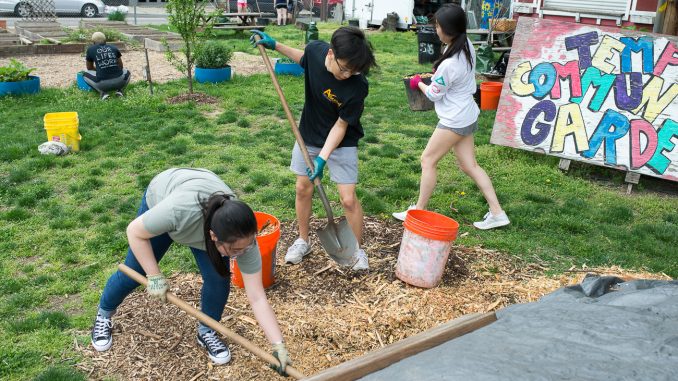
Starting in August, students on lavender bikes will be towing trailers of old food around Temple’s surrounding streets — part of the brand new composting initiative.
Temple Student Government and the Office of Sustainability created a student-led Compost Collection Service for off-campus students living within Temple Police’s patrol boundary. Beginning in the fall semester, student volunteers will bike to pick up compost buckets form participating students and transport them to Temple’s community garden, located at Diamond and Carlisle streets.
“We’ve had a lot of interest from students who want to volunteer, so I’m excited to see them rolling around on the bikes hauling some compost,” said Kate Lyons, a junior geology major.
The Temple garden already has a composting bin accessible to the public, but creators Lyons and Sarah Kuchan, a senior environmental science and political science major and TSG director of sustainability, wanted to create program to make composting more accessible to students.
Connor Caruso, a senior environmental studies major and community garden president, said the initiative has two segments: the student biking volunteers and the garden volunteers handling the compost — they’ll be the ones responsible for placing the client’s food waste into the larger community garden compost bin to later turn into fertilizer.
“Students that live on campus, they already sort of have the luxury of their food waste being handled by Temple’s food services and there’s already composting on campus in J&H,” Caruso said. “We really wanted to focus our attention on the students living off campus who don’t have any option to compost other than to physically bring their compost to the garden.”
Lyons said she was inspired by a friend from Southhampton, England who had a similar initiative at her school. After researching the different composting companies in Philadelphia, however, she noticed many charge for compost collecting.
“It’s almost like having a private trash collector,” Lyons said.
Lyons said she recognized that many students were unable to afford a private collection service and wanted to create something more accessible. Through the volunteer program and the Office of Sustainability’s Green Grant, which Lyons applied for, her service will only require a $5 deposit to purchase the bucket.
Kathleen Grady, the Office of Sustainability director, said she is hopeful for the program’s success because it is student-run.
“Student-led initiatives are my favorite types of initiatives, students know what’s going to work with other students so they’re not going to ask students to do something that is unrealistic,” Grady said. “It just feels inspiring, and it feels exciting to me to be able to see an instantaneous change, it gives me a lot of hope.”
Lyons believes the compost service might be the push for some students to start living more sustainably, as many students are looking for a sustainable initiative to participate in.
“Projects like this are key to getting people involved, getting people to make lifestyle changes, and also getting people excited about stuff when its fun and they can ride their bike and be a part of the community garden,” Lyons said.
After determining the success of the pilot program, Lyons hopes to extend the compost initiative to the surrounding community.
“[I want to] educate the surrounding areas about how they can access composting and even if it’s not financially feasible for them with the other compost services in the city,” Lyons said. “I want to teach as many people as possible about the benefits of urban gardening.”


Be the first to comment